- Home
- Joseph Bruchac
Talking Leaves Page 4
Talking Leaves Read online
Page 4
I look over at him and he nods his head, a little smile twisting his lips as he does so.
Eat, he is telling me.
I eat.
I finish one bowl of stew. It has onions and turnips and chunks of beef, all floating in a thick brown broth. Of course it is not as fine as my mother’s cooking, but it is good.
“More, Uwohali?” my stepmother says, bringing the pot over to me.
“Wado!” I reply as I accept another bowlful and then hold up my empty cup so that my sister can fill it again with cider.
When I am done, Ahyokah tugs at my sleeve.
Leave me alone, I think.
But she tugs at my sleeve a second time.
I turn to look at her, even though I wish she would just leave me alone. I don’t want to spend time with her. I haven’t come here to get to know her but to learn something useful from my father.
“Are you ready to meet my dolls?” she asks.
I want to say no.
Not now, I think. But before I can reply she turns toward Sequoyah.
“Father, can I show Uwohali my friends now?” she asks.
A warm smile creases my father’s face. It’s clear that he will agree to anything my half sister asks of him.
I feel a surge of anger toward this little girl who took my place. But I don’t let that emotion show on my face, even though my hands squeeze the wooden tabletop so hard that my knuckles turn white.
“Uh-huh,” Sequoyah says. “If it is agreeable with your brother.”
He looks at me. What can I do? I nod my reluctant head.
“Good,” my father says. He holds up his long-stemmed pipe. “I will be on the porch.”
Ahyokah takes my hand and leads me to the back of the cabin. Her three corn-husk dolls, made in the proper way with no faces, are sitting there on a miniature bed that I am certain was carved by my father. It makes me feel even more jealous of all the attention he has given her, attention I never received.
Yet, at the same time, I can’t stop myself from admiring the workmanship that went into making that little bed and my sister’s little friends. I sit down cross-legged on the floor to look closer at them. They are not at all like the dolls that non-Tsalagi children have, like the one I saw once being held in the arms of a white child who was being driven by in a carriage. That white child’s doll had such a shiny, humanlike face that I found it disturbing to see.
Ahyokah’s three friends were made in our old way from dried corn husks folded and tied together to make a head, a body, and two arms. Each one is dressed like a Tsalagi woman. And, of course, they do not have faces on them.
My little sister is leaning her head against my shoulder.
“Do you know why corn-husk dolls never have a face?” I ask.
“Can you tell me why?” she asks.
And almost before I know it I am telling her the story.
“It was because of the first of their kind. Long, long ago, that first corn-husk doll was so good-looking that everyone admired her. Everyone talked about how beautiful she was. Corn-Husk Doll heard what people said and she became vain.
“‘No one is as beautiful as I am,’ she boasted.
“She began to spend much of her time looking at her reflection in the water and admiring herself.
“‘I am so beautiful,’ she would say. ‘I am so very beautiful!’
“One day, though, as Corn-Husk Doll sat gazing at her face in the water, those waters were rippled by the wind. And then, just like that, her face disappeared from her head. Ever since then, no corn-husk doll has had a face. And so we tell all our little girls that story to remind them to not be vain and boast about their good looks.”
Ahyokah climbs into my lap and gives me a hug.
“That was such a good story,” she says. “You are just as good as Father at telling stories.”
Despite my desire to have nothing to do with this little sister I’ve just met, it seems that all I have done is make her like me more. Plus I am finding it harder to dislike her. I can’t help but feel some pride about what she said—that I am like my father in some way. It actually feels pleasant to have her sitting in my lap like this with her head leaning back against my chest. I’m not sure I like the way it is making me feel protective of her. I cannot think of what to do or say. I look over at the three corn-husk dolls.
I carefully disentangle myself from her arms.
“Can you tell me about your friends?”
“Oh yes!” Ahyokah says, hopping out of my lap like a little squirrel leaping down from a stone. She gathers up the three dolls and brings them back to me.
“They are my best friends, and they are always happy to see me. And that is good because the other girls of my age do not want to play with me.”
For a moment, a sad look starts to come over her happy face—like a cloud moving in front of the sun. I suddenly realize that whatever suspicion people might have about me visiting my father, it must be much worse for Ahyokah, who is living in the same house with him. But that sad look passes quickly and her eager smile comes right back again.
“They are sisters, you know. That is why they all look alike. This one is Meli,” Ahyokah says, handing me the first doll. “She is pleased to see you.”
“Osiyo, Meli.”
“And this is Madi and this is Losi.”
“Osiyo, osiyo,” I say.
Ahyokah looks pleased.
“How do you know who is who?” I ask.
“It is easy,” Ahyokah says. “Meli has the blue sash, Madi has the red sash, and Losi has the white sash.”
Ahyokah is so serious that I cannot resist teasing her. “But what if their sashes fell off? How could you tell which one was which? After all, you said they are sisters and all look alike.”
Ahyokah giggles. “Silly,” she says, “I can always tell them apart.”
She takes the doll she called Losi from my hand and turns her around.
“See!”
On the back of the doll are two shapes carefully marked in ink. They look familiar to me because I have seen them before in one of the missionary’s books he called a primer. He uses that book to teach us the twenty-six letters in the English alphabet, letters that I have already learned. One resembles a capital . The other looks like a small .
“Ah,” I say. Then I speak the letters. “Gee bee.”
Ahyokah looks up at me. “What is geebee?”
I point at the two inked shapes. “Gee and bee,” I say.
“Tlahhuh!” Ahyokah says. “No!” She puts her little finger on the two shapes one after the other. “Lo,” she says. “Si.”
I’m confused, confusion that grows strong when she takes her other two dolls and shows me the marks on their backs.
“Meli,” she says. “ Me” and “ li.”
“Madi,” she says. “ Ma” and “ di.”
Those marks look nothing at all like any of the twenty-six letters I have learned from the missionary.
“Ahyokah,” someone calls from behind us. It takes a moment for me to realize it is my stepmother.
“Yes, Mother?”
“Now that your brother has met your dolls, let him go out on the porch with your father. You can come help me clean up.”
Ahyokah looks up at me again. I know what that look on her face means. I suspect it is on mine whenever my own mother calls me away from something I am doing. I grin at her and then look up toward the roof of the cabin.
What can we do except what our mothers ask us to do?
Ahyokah sighs, then gives me a little conspiratorial smile and nods.
What, indeed?
“I am coming, Etsi,” she says.
And as soon as she dances out of the room it feels empty. Am I missing her presence? Despite my best efforts, have I begun to like this little
half sister I was so determined to ignore?
CHAPTER 6
Marbles
There are two chairs on the small porch of Sally Guess’s house. My father has settled himself peacefully into one of them and has already lit his pipe. Every now and then he lifts it from his lips and lets a little cloud of smoke drift up from his lips.
I have seen how some old people smoke. They puff hard on their pipes and chew the stems. They make it seem more like work than something that relaxes them. But it seems that even smoking, like everything my father does, is something that he does with a sort of gentle ease.
He nods his head toward the other chair. I settle in next to him.
As we sit there, neither of us speaking, I begin to wish I had something to occupy my hands as he does with his pipe. Young people do not smoke. It is that way with our people, unlike the white men who seem to use tobacco all the time, whether they are young men or older. We Anitsalagi believe that tobacco is too special for that. It is something that the Creator gave as a gift. Young men may smoke the pipe with others in a ceremonial way as a sign of peace. But solitary smoking is meant only to ease the lives of those who are elderly. Although even the elderly should not smoke all the time because it might make them sick.
My father finishes the pipe, taps it out into his hand, and then gently blows away the ashes. “Wado,” he says to the little wind that swirls away the ashes.
Then, as he tucks the pipe in his vest pocket, he turns to me and says:
“Back when the world was new,” he says, “there were seven old men who were leaders of their people. It was a time when there was fighting going on and it was the job of those old men to bring peace. But when they gathered together, they did not talk about peace. All they did was to bend their heads over their pipes and keep smoking, even though the proper time to do so would have been after peace was made. The smoke rose up from their pipes and turned into clouds.
“They smoked for seven days and nights. Seeing what those old men were doing, the Creator was not pleased. Instead of trying to bring peace, they were just smoking. So he turned those seven elders into those grayish-white flowers that bend over like old men smoking pipes.
“Today those pipe flowers, which are the color of an old person’s hair, grow wherever friends and relatives have been quarreling to remind them to try to find peace.”
My father looks off to the east, toward the big mountains that rise there.
“And the Creator also made smoke that stays over the mountaintops as a further reminder. It will remain there until the day comes when everyone finally learns to live in peace.”
The story finished, my father settles back into that companionable silence of his. I feel comfortable sharing that silence. You do not always have to be talking to communicate with someone. And that silence gives me time to think about that story and about tobacco.
All of us Anitsalagi like to have tobacco with us wherever we go. It is such a sacred plant, such a gift from the Creator. When we gather medicine or hunt, we offer tobacco as a sign of our gratitude. That way the balance is made right. You should never just take from the world without giving something back. I think back on the day when I gathered the clay for my marbles. I made a little indentation in the clay bank and put some tobacco there.
My marbles.
I have them with me in my pocket. All of my friends and I carry our marbles with us whenever we leave our homes. That way if we meet a friend or two along the way we can sit down together, scratch a circle into the earth, and have a game. And although I may not be as good a player as my best friend Yugi, I always come away with at least as many marbles as I started with.
I reach in my pocket and feel their comforting solid shapes with my fingertips. I pull several of them out and roll them around in the palm of my right hand, letting them click against one another.
All of the marbles I make are quite round. None of them have any cracks in them. But they do not look alike. They are different sizes and colors. The small ones are quicker to make. The clay doesn’t have to be completely dry when you put them into the fire to harden them. And the various colors come from both the different clays that are used and the type of wood with which you make your fire. If you choose yellow locust, the same tree from whose saplings we make bows, you will get a fire that gets very hot very fast. If you use tsiyu, the tulip poplar from whose logs we make our houses and which was used in the past for our canoes, the fire will not be so hot and the color of the marble will be lighter.
Whenever you make marbles, you should not hurry. You should place the balls of clay that will become your marbles carefully so they are not touching one another. You should pile the split pieces of wood just right and make sure that the fire is burning evenly. Then you should wait until it has all cooled down before trying to take your marbles from the fire. Do not be impatient. Otherwise you may end up with burns on your hands from those still hot marbles, burns that may turn into scars—like the ones on the thumb and index finger of my impatient friend Ugama.
“You made all of those?”
I hadn’t noticed, as I rolled those marbles about in my hand, that my father had leaned over to look at them.
“Uh-huh,” I reply. Then my tongue sticks in my mouth. I am not sure what to say next.
My father reaches out one long finger to tap it against one of the marbles. It’s a medium-sized brown marble with a slightly pitted surface.
“Not this one,” he says.
He’s right. That marble is one that I won in a game with Galuloi and Ugama. At the end the three of us came out even, but that brown marble was one Ugama made. The shortest and roundest of my friends, he is also the fastest runner. But, though his speed is certainly a gift, his lack of patience is not. Whenever he fires his marbles, he always does it in such haste that some always end up either breaking or being imperfect like this one.
But that does not upset him. “It doesn’t matter if the marbles I make are not as good as yours, Uwohali,” Ugama sometimes says, a big grin on his round face. “Sooner or later I will win all of your marbles from you.”
I smile as I remember that remark of his. Especially because I know it will never prove to be true.
My father nods at that smile of mine. “You won it from a friend and you are thinking of him right now,” he says.
I nod.
“It is good to have friends,” he says.
He picks up one of the marbles from my hand, the one I like the best. It is a milky blue color and almost as smooth as glass.
“Well made,” my father says. “Are you good at making things?”
This time my voice does not fail me. “I like to make things, but I am not that good. I would like to learn how to be better. I am interested in learning.”
And that is why I am here. I want you to teach me painting and carving and how to work silver and how to be a blacksmith.
That is what I think. But I do not say it.
My father settles back into his chair. “Interested in learning,” he says in a low voice. He seems to be saying that to himself rather than to me. He reaches his hand up to his chin and strokes it with two fingers. “Hmmm.”
What he says next surprises me.
“How is your mother?”
“My mother?”
“I have heard that she is well.”
“Yes, she is.” My answer is quicker, sharper than I intended. I did not come here to talk about my mother.
“Does she know that you have come here to see me?” He nods toward my chunkey stick still leaning against the porch near the bottom of the steps. “Or did you tell her you were going to go and play with your friends?”
“Yes,” I say. “I mean no. I mean . . .” I pause, trying to get my words right. I usually do not have trouble saying what I mean, but I am just so unsure where this conversation is going that my thoughts are t
ripping over each other like clumsy runners in a race. I take a breath. “Yes, I told my mother that I was going to visit you.”
“Even though she disapproved of it?” He asks that as a question to which he already knows the answer. And his tone is mild, his words followed by one of those warm chuckles that seem to be a natural part of his conversation.
“Osdadu,” he says, “it’s all right. Of course your mother would be worried about your wishing to see your crazy old father.”
I start to say something, but he raises his hand.
“I know what everyone says, that my mind is not right. Just as I know that it was not easy for your mother when we were together. She had good reason for ending our marriage. Just as I had good reason for staying on this path.” He looks out from the porch as if looking at something a long way away.
I follow his gaze, but all I can see is the road, the bare trees, the land beginning to slope down toward the river.
“But still your mother did not stop you.” My father is nodding his head again. “She has always been wise, your mother. She knows that trying to keep your child from doing something seldom produces the result you wish.”
He looks back at my carefully notched stick. “Do you know the story of the seven boys who were always playing chunkey?”
I think I do. I cannot remember a time when I didn’t love to listen to stories. My uncle Red Bird used to say that my hunger for stories was almost as great as my hunger for food. Red Bird.
I cannot keep a sad look from coming to my face as I remember my uncle. I’ve been missing him so much.
“What is troubling you?” my father says in a soft voice. And then, almost as if he can read my mind, he leans closer. “Are you thinking of your uncle?”

 Peacemaker
Peacemaker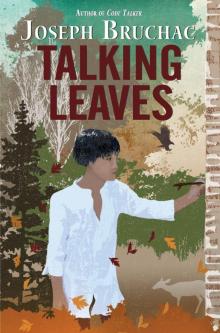 Talking Leaves
Talking Leaves Found
Found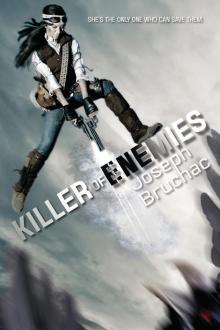 Killer of Enemies
Killer of Enemies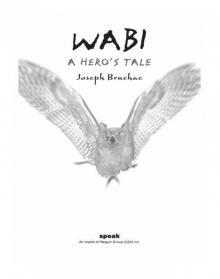 Wabi
Wabi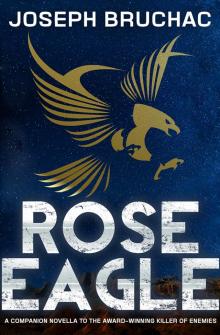 Rose Eagle
Rose Eagle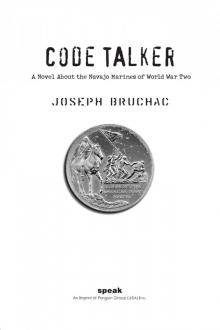 Code Talker
Code Talker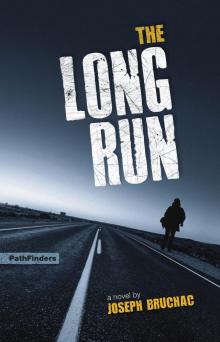 The Long Run
The Long Run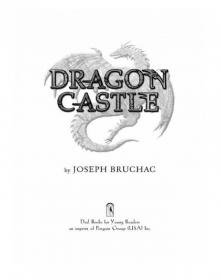 Dragon Castle
Dragon Castle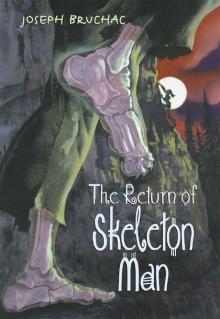 The Return of Skeleton Man
The Return of Skeleton Man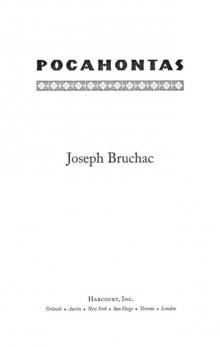 Pocahontas
Pocahontas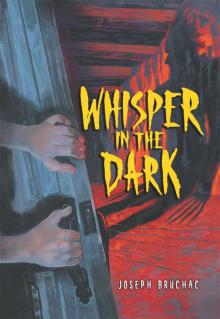 Whisper in the Dark
Whisper in the Dark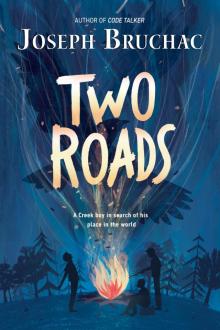 Two Roads
Two Roads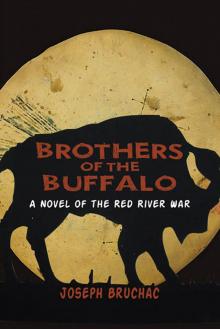 Brothers of the Buffalo
Brothers of the Buffalo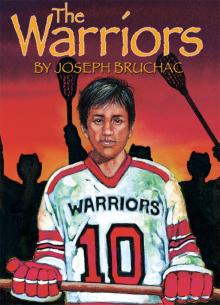 The Warriors
The Warriors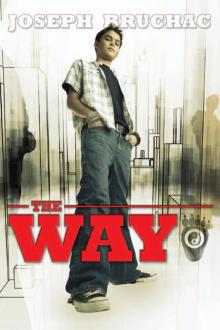 The Way
The Way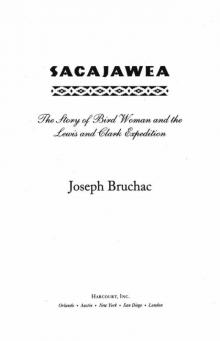 Sacajawea
Sacajawea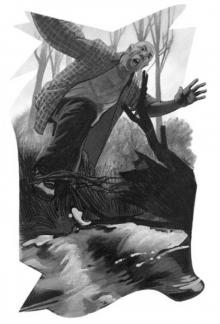 Night Wings
Night Wings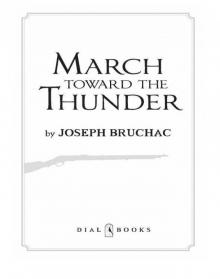 March Toward the Thunder
March Toward the Thunder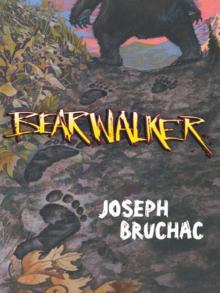 Bearwalker
Bearwalker Skeleton Man
Skeleton Man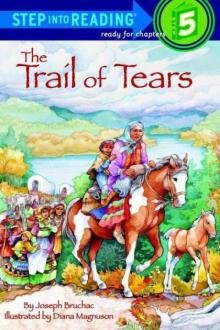 The Trail of Tears
The Trail of Tears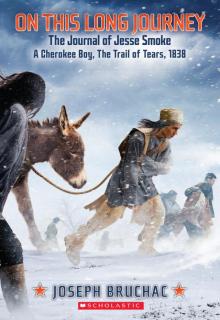 On This Long Journey
On This Long Journey Flying with the Eagle, Racing the Great Bear
Flying with the Eagle, Racing the Great Bear